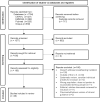Lactation Support for People Who Are Incarcerated: A Systematic Review
- PMID: 36301257
- PMCID: PMC9700340
- DOI: 10.1089/bfm.2022.0138
Lactation Support for People Who Are Incarcerated: A Systematic Review
Abstract
Background: Lactation support, defined here as the access to educational resources, supplies, mental health and psychosocial support, skilled lactation counseling, and peer support, has been identified as critical to optimal health outcomes for birthing parents and infants. People who give birth while incarcerated are likely to receive suboptimal lactation support. The purpose of this review is to explore the literature on lactation support for incarcerated people to identify existing programs and policies, gaps in lactation support and ways to address the gaps, and incarcerated people's perspectives on breastfeeding and lactation support. Methods: We conducted a systematic review of the peer-reviewed literature to identify studies that addressed two main concepts: (1) breastfeeding and (2) incarcerated populations in the United States. Results: After meeting the eligibility criteria, 29 studies were included in the qualitative synthesis of the findings. Studies highlight the importance of supporting birthing people who want to provide milk to their infants in a way that is desired, psychologically safe, and structurally supported. Programs are needed to delay or prevent parent-infant separation after birth, provide education around breastfeeding misconceptions, and link to resources and ongoing support for both breastfeeding and milk expression. Implementation of breastfeeding programs may be most effectively undertaken with clear policies and dedicated leadership either internally or through community or health care partnerships. Discussion: This review highlights the policies and practices that hinder adequate lactation support for birthing parent-infant dyads who are incarcerated and describes feasible policies, education, and clinical support that can be used to improve care.
Keywords: breastfeeding; correctional sites; equity; incarceration; lactation; policies and procedures.
Conflict of interest statement
The authors have no conflicts of interest to disclose.
Figures
References
-
- Carson EA. Prisoners in 2019—Bureau of Justice Statistics. Washington, DC; 2020.
-
- Minton TD, Zeng Z. Jail Inmates in 2020—Statistical Tables. Washington, DC; 2021.
Publication types
MeSH terms
Grants and funding
LinkOut - more resources
Full Text Sources
Medical


